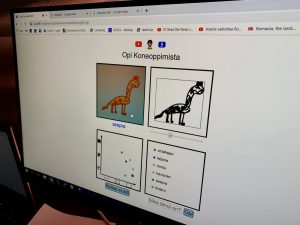Computing Education
 Research in the Computing Education focus area seeks solutions to problems primarily related to computational thinking and programming education. Our special attention has been in K-12 level, but we work to improve programming education also in higher education.
Research in the Computing Education focus area seeks solutions to problems primarily related to computational thinking and programming education. Our special attention has been in K-12 level, but we work to improve programming education also in higher education.
Our specialisation in computing education has been usage of educational robotics to teach programming and computational thinking. Early 2000’s we started regular robotics club activities for school children, and since that activities were expanded to teacher education.
Teaching methods and toolsets developed in these activities led to a strong and lively network of computing and technology educators, which had also a strong influence to the content of national primary and secondary school curricula refreshed at 2016. Nowadays programming and computational thinking teaching is part of schools’ everyday activities.
Recently, we have studied how modern computing methods, such as machine learning affect to computational thinking teaching when abstraction level is risen and computing paradigm is changed from rule-driven to data-driven.
Our research group has organized since 2001 the Koli Calling International Conference on Computing Education Research, which is one of the leading international conferences dedicated to the scholarship of teaching and learning and to education research in the computing disciplines. The conference is held annually in Koli natural park, Finland, with exceptions during 2020-21 when the conference took virtual format. Koli Calling proceedings are usually published in the ACM Digital Library.
Recent projects
- RoboSTEAM – Integrating STEAM and Computational Thinking Development by Using Robotics and Physical Devices (2019 – 2021), Erasmus+ KA2 – Strategic Partnership for School Education, 2018-1-ES01-KA201-050939
- TACCLE3 – Coding (2015 – 2017), Erasmus+ KA2, 2015-1-BE02-KA201-012307
Selected publications
- H. Vartiainen, T. Toivonen, I. Jormanainen, J. Kahila, M. Tedre, T. Valtonen, Machine learning for middle schoolers: Learning through data-driven design. In International Journal of Child-Computer Interaction, 100281, 2021.
- M. Á. Conde, F. J. Rodríguez-Sedano, C. Fernández-Llamas, M. J. Ramos, M. D. Jesus, S. Celis, J. Gonçalves, J. Lima, D. Reimann, I. Jormanainen, J. Paavilainen, F. J. García-Peñalvo, RoboSTEAM Project: Integrating STEAM and Computational Thinking Development by Using Robotics and Physical Devices. In García-Peñalvo, F. J. (Ed.), Information Technology Trends for a Global and Interdisciplinary Research Community (pp. 157-174). IGI Global, 2021.
- I. Jormanainen, M. Tukiainen, Attractive educational robotics motivates younger students to learn programming and computational thinking, In Proceedings of the Eighth International Conference Technological Ecosystem for Enhancing Multiculturality (TEEM2020), October 21–23, 2020, Salamanca, Spain. ACM, New York, NY, USA, 7 pages, 2020.
- R. Mariescu-Istodor, I. Jormanainen, Machine Learning for High School Students, In Proceedings of the 19th Koli Calling International Conference on Computing Education Research, 2019.
- T. Toivonen, S.S. Oyelere, BiGO: A toolset to support CS students to learn to analyze time complexities of algorithms, In Proceedings of the 19th Koli Calling International Conference on Computing Education Research, 2019.